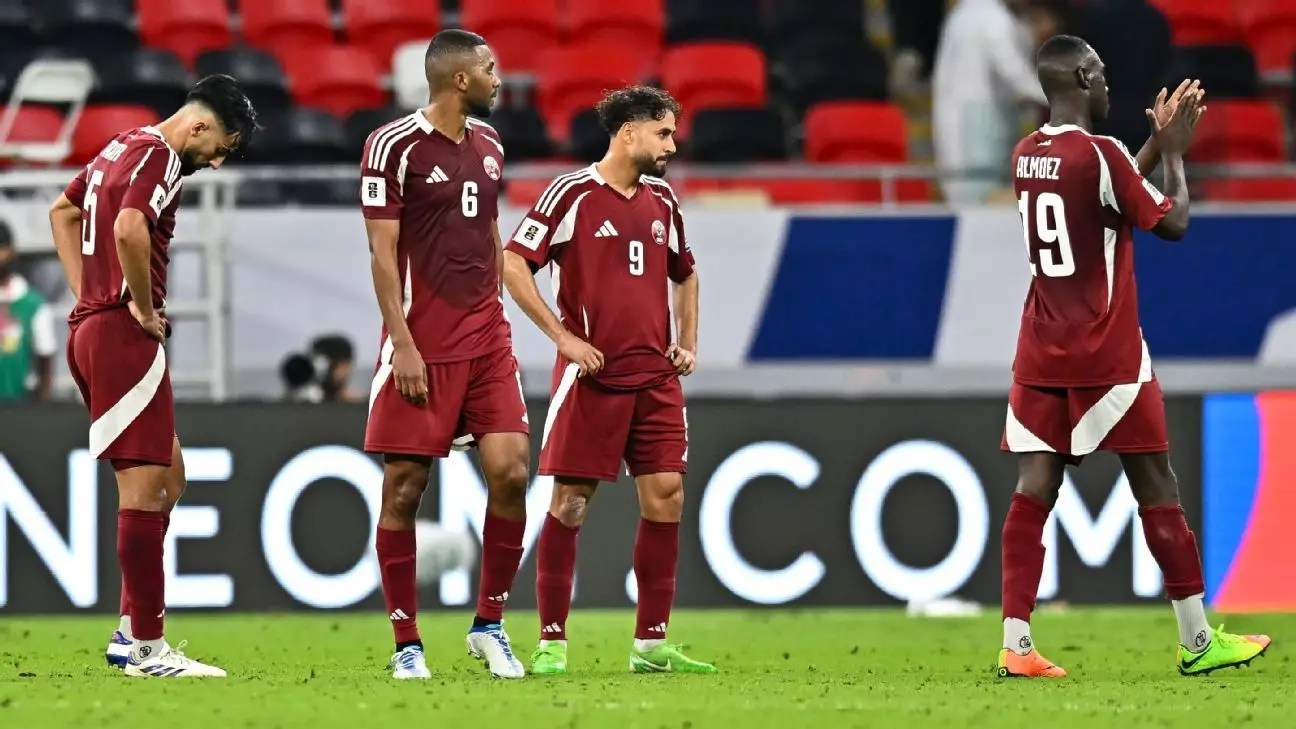In the wake of their debut as hosts for the FIFA World Cup 2022, Qatar’s ambitions to secure qualification for the upcoming tournament are fraught with challenges. The expanded format of the World Cup in 2026 promises more opportunities for teams to qualify, with Asia receiving an additional eight spots. Given Qatar’s recent success as the reigning champions of the Asian Football Confederation (AFC), expectations were high for their performance in the qualifiers. However, their current standing in Group A leaves much to be desired as they occupy a disappointing fourth position. The gaps between performance and potential have become glaringly evident.
While it was anticipated that Iran would be a formidable adversary in the quest for the top spot, Qatar was expected to vie for second place against Uzbekistan and the United Arab Emirates (UAE). Surprisingly, as they enter the final games of this qualifying phase, Qatar’s track record has been subpar, reflecting a mere two victories out of six matches. Their lack of points, coupled with a dismal defensive record that sees them at the bottom of the pack, has raised significant concerns about the team’s prospects moving forward.
The statistics paint a grim picture for the Qatari side. A shocking 5-0 defeat to the UAE exemplifies the alarming decline in their competitiveness. This match, which saw them succumb to three goals before halftime, marked a nadir in their current campaign. Their frailty in defense has been laid bare, with 17 goals conceded, making them the weakest defensive unit among the competing Asian teams. Such a startling reversal has prompted questions about the team’s tactical discipline and resilience.
The concerning revelations do not end there; Qatar also stumbled with a 2-2 draw against North Korea, a team that had not participated in the previous World Cup qualification. Despite having a numerical advantage due to a red card shown to an opposing player, Qatar failed to capitalize, which only adds to their mounting frustrations. Tasked with securing a vital win against Uzbekistan, they managed a narrow 3-2 victory, needing a last-minute equalizer to secure all three points. Each of these results chips away at their confidence with every passing matchday.
In examining Qatar’s performance, one might conclude that a lack of long-term planning has undermined their potential. The prevailing narrative suggests that an overreliance on seasoned players has hindered the introduction of fresh talent into the squad. Despite their recent victories in the Asian Cup, Qatar’s strategy has raised eyebrows regarding its sustainability. While seasoned players like Boualem Khoukhi and Abdulaziz Hatem have played significant roles in the squad, a more balanced approach that incorporates youth alongside experience might be the ideal solution.
However, this assumption oversimplifies a complex scenario. Many in the core group of Qatar’s Asian Cup-winning squad are still in their prime. Players such as Akram Afif and Almoez Ali, now 28, remain vital assets, while others like Bassam Al-Rawi continue to be groomed for future leadership roles. The ongoing emergence of young talents, notably 19-year-old Ibrahim Al-Hassan, hints at an emphasis on development within the national program. This focus on youth, despite being overshadowed by older heads, exemplifies a commitment to building for the future.
Another element contributing to Qatar’s struggles involves tactical inconsistency. The leadership of coach Tintin Márquez, who previously steered the team to an Asian Cup victory, is now under scrutiny. His frequent adjustments to formations, from 5-3-2 to 4-4-2, and the fluctuating positioning of key players like Afif raise questions about the team’s coherence and identity. A coherent strategy is essential, especially when the players are left uncertain about their designated roles.
Additionally, the leadership transition within the squad presents a unique set of challenges. Afif’s ascension to captaincy has shifted the dynamics, as the nation now seeks a leader capable of rallying the troops in tumultuous times. While he possesses the technical skill to inspire, his leadership style contrasts with that of: the more vocal previous captain, Hassan Al-Haydos. Capturing the essence of effective leadership translates not just into capabilities on the field but also into the ability to forge unity and resolve within the team’s ranks.
As the final matches of qualification loom, Qatar’s focus must shift to harnessing their potential and reclaiming their competitive edge. With four matches yet to unfold, they face a crucial junction. They must rally together, refine their tactical approach, and secure enough points to at least qualify for the next round of the Asian qualifiers.
Despite the palpable sense of uncertainty, Qatar’s storied history in regional football provides a basis for hope. They must leverage their past triumphs and learn from their current obstacles to pave the way for future success. As they navigate through this testing period, unity, strategy, and resilience will be the key ingredients for overcoming the hurdles that lie ahead in their captivating journey towards World Cup qualification.


Leave a Reply